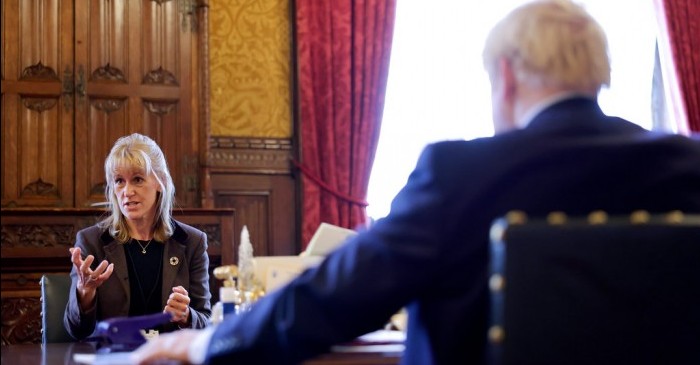The successful conclusion of a deal between the UK and EU is ‘very positive news for British agriculture’, according to NFU president Minette Batters.
Parliament is set to return on December 30 to ratify a deal that for the past few weeks has looked in doubt. News of a deal, which will see tariff free trade with the EU continue, has been greeted with relief across the agricultural sector, which feared the impact of a no deal on our all-important trade with the EU.
However, industry leaders have warned that there will still be disruption from January 1 as new checks and certification is required on goods traded between the EU and UK.
Mrs Batters said: “The EU is our largest trading partner and we have been clear throughout negotiations that maintaining tariff-free access to the EU market is absolutely crucial for our food and farming industry, not only for farmers’ businesses and livelihoods, but for our ability to continue to provide a secure supply of quality, home-grown food for the nation.
“We will now analyse the details of this agreement to ensure it meets the needs of British food and farming. The tariff-free element will be a particular relief for farmers that rely heavily on the EU export market, such as our sheep farmers, as well as farmers across British agriculture that produce the safe, traceable and affordable food that underpins more than £14 billion worth of export sales each year to the EU.
“It does remain the case though that our relationship with the EU will experience a fundamental change at the end of the transition period on 1 January 2021 and we do anticipate that there will still be disruption to trade at the border. New checks, paperwork and requirements on traders will add costs and complexity. It is vital government does all it can now to prioritise exports of our high quality, perishable agricultural products to make sure that these products are not left languishing in queues at the border when the changes take effect.
“With only seven days left until the end of the transition period and traders still facing a huge amount of disruption on the ground, I would urge both the UK and EU to now use the basis of this deal to continue talks to manage any disruption we may experience from 1 January.”
The NPA said: “The news of a deal with the EU is a welcome relief to the British pig industry. We will study the detail of the agreement and there will be challenges as we move to new trading arrangements. However, the avoidance of ‘no deal’ gives us all greater certainty about the future.”
NFU Scotland President Andrew McCornick said: “It is good news and a huge relief that a deal has been done. The delay in getting agreement has meant that farmers and crofters, who had been forced into making big business decision for 2021 in a void, now have a degree of certainty that European markets will be accessible next year for most of their products.
“No deal would have been no good to Scottish farming, food and drink and the worst-case scenario of crippling tariffs for some sectors, particularly sheep and cereals, has now been averted.
“We will now need to see the detail of what has been agreed and scrutinise it closely.”
Country Land and Business Association (CLA) president Mark Bridgeman said:: “Whilst we are yet to see full details of the agreement, it seems clear that many farmers and rural business owners will be breathing a sigh of relief – both in the UK and the EU.
“The EU sells £33bn of agricultural products to the UK each year, which is almost £20bn more than we sell to them. So it was right for the Prime Minister to negotiate hard, but a No Deal scenario would have likely been catastrophic for a number of farming sectors and it was vital that a deal was struck.
“But a word of warning: we have seen this week the importance of keeping trade routes open, particularly between Dover and Calais. Trade in perishable food is especially vulnerable to friction at ports – so it is now hugely important that UK and EU politicians continue to find ways to make trade between our markets as simple and low-friction as possible.”
lan Clarke, QMS Chief Executive said: “Brexit is an issue of vital importance to businesses in the industry and many companies, particularly in the sheepmeat sector, will be relieved that the transition period will conclude with a deal to avoid tariffs that could have made EU trade unaffordable while depressing prices at home.
“Nonetheless, businesses trading with Europe after the New Year will still need to make sure they are prepared for adjustments in areas from certification to border control measures. They will look to government for clear guidance and support in the weeks and months ahead to help them adapt successfully to these new measures in the short term.”
Lee Holdstock, Senior Business Development Manager, Soil Association Certification, said: “We’re delighted to hear that the UK has reached a trade deal with the EU and hope this leads to both increased certainty and reduced complexity around trading organic products, allowing UK organic businesses to continue trading in the EU and minimising long term disruption to vital trade flows between the UK and Europe.
“However, this news comes frustratingly late in the day for organic suppliers who have already begun making adjustments and preparations for a no deal scenario – so we urge governments to call for grace periods that will enable businesses to change tack once more. The organic market is booming, with UK organic sales on track reach £2.6BN by end of 2020, after reaching their highest growth level in over a decade at 9.5%*- so it’s crucial that Government ensure any obstacles to the continued success of the sector are minimised.”




